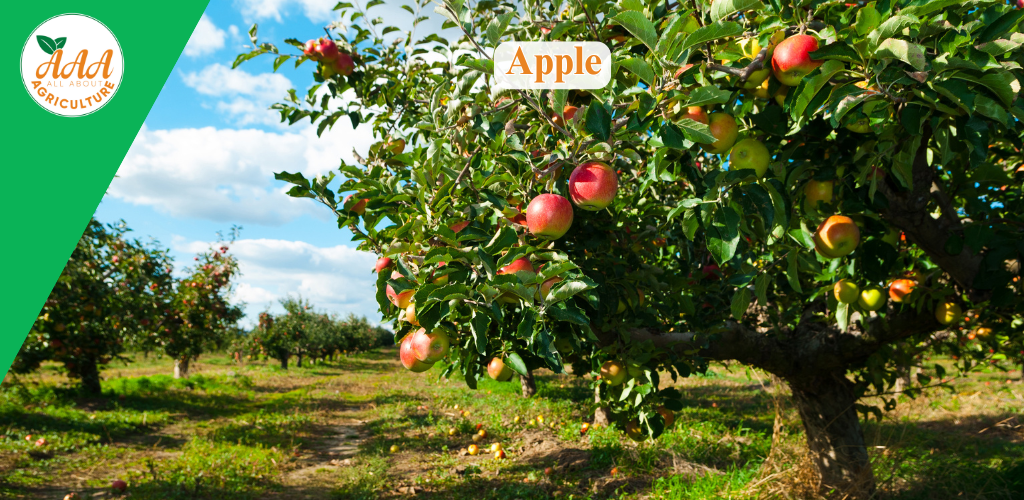APPLE
APPLE

Apple Production in India: India is one of the major producers of apples, although it doesn’t rank as highly as countries like China or the USA. However, it still contributes significantly to global apple production.
Rank: India is the 6th largest apple producer in the world, producing a substantial quantity of apples, particularly in the Himalayan region.
Top Apple-Producing States:
Jammu & Kashmir – The largest apple producer in India.
Himachal Pradesh – Known for a variety of apples.
Uttarakhand – Increasingly significant for apple production.
Arunachal Pradesh – Also contributing to apple production in Northeast India.
Temperature and Growing Conditions for Apples:
Temperature:
Ideal Temperature Range: Apples require cold climate for optimal growth. The ideal temperature range is between 18°C to 24°C (64°F to 75°F) during the growing season.
Winter Chill: Apples need cold winters for dormancy and fruit development, requiring temperatures below 7°C (45°F) for a certain number of days.
Frost Sensitivity: Apples are sensitive to late spring frosts, which can damage flowers or young fruit.
Rainfall:
Apples prefer regions with moderate rainfall. An annual rainfall of 600 mm to 1,200 mm is ideal.
Excessive rainfall during flowering or fruiting can lead to diseases like apple scab and powdery mildew.
Soil:
Soil Type: Apples thrive in well-drained, sandy-loam or loamy soils with good organic content.
Soil pH: The ideal soil pH is between 6.0 to 6.5 (slightly acidic).
Drainage: Proper drainage is crucial to prevent waterlogging, which can lead to root rot.
Sunlight:Apples require full sunlight for 6 to 8 hours a day for proper fruit development.
Attractive Information About Apple Production in India:
High-Quality Varieties:
India produces high-quality apples, particularly in Himachal Pradesh and Jammu & Kashmir. Famous varieties include:
- Royal Gala
- Red Delicious
- Golden Delicious
- Kashmir Apple (Famous for its unique taste)
Export Potential:
India exports apples to several countries, particularly in the Middle East, Southeast Asia, and some European countries.
Apples from Jammu & Kashmir are especially prized for their crisp texture and sweetness.
Economic Importance:
Apple cultivation is a significant part of the economy in Himachal Pradesh and Jammu & Kashmir, providing income to hundreds of thousands of farmers.
It also supports related industries like packaging, storage, and transportation.
Innovations in Farming:
Farmers are increasingly using high-density orchards and adopting modern irrigation systems, including drip irrigation, to improve yield and quality.
Organic apple farming is becoming popular, with a growing market for organic apples in both domestic and international markets.
Export and Domestic Demand:
With growing domestic consumption and international demand, there’s a consistent market for Indian apples.
Apples are a key fruit in India’s winter season and are used in various products like juices, jams, and desserts.
Climate Adaptation:
While apples require cold climates, modern farming techniques like greenhouse farming and temperature-controlled storage are helping apple farmers extend the growing season and reduce losses.
Post-Harvest Handling:
Cold storage and controlled atmosphere storage technologies are being adopted to extend the shelf life of apples and reduce wastage.
Better packaging methods help in improving the transport quality, ensuring apples reach consumers in good condition.
Challenges in Apple Production in India:
Climate Change: Irregular temperatures, reduced chill hours, and increased incidences of frost in the spring can harm apple production.
Pests and Diseases: Apple crops are susceptible to pests like codling moth, apple scab, and aphids, requiring careful pest management.
Market Access: Farmers face challenges in reaching national and international markets due to packaging and transportation constraints.
Modifications and Improvements:
Variety Improvements: Introduce more cold-resistant varieties that can tolerate less chill for areas experiencing warmer winters.
Irrigation: Implement drip irrigation to conserve water and maintain consistent moisture levels.
Integrated Pest Management (IPM): Use biological control methods and reduce reliance on chemicals for sustainable pest management.
Climate Adaptation: Use greenhouses and net houses for controlling temperature and protecting crops from adverse weather conditions.
Post-Harvest Techniques: Invest in advanced storage facilities to minimize spoilage and extend the shelf life of apples.